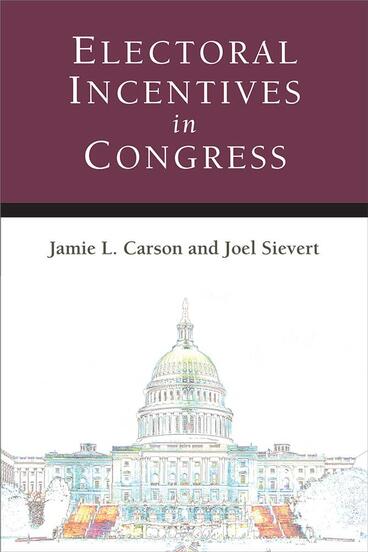Electoral Incentives in Congress
Legislators in the 19th century behaved much as we expect legislators to behave today.
Description
David Mayhew’s 1974 thesis on the “electoral connection” and its impact on legislative behavior is the theoretical foundation for research on the modern U.S. Congress. Mayhew contends that once in office, legislators pursue the actions that put them in the best position for reelection. Carson and Sievert examine how electoral incentives shaped legislative behavior throughout the nineteenth century by looking at patterns of turnover in Congress; the renomination of candidates; the roles of parties in recruiting candidates and their broader effects on candidate competition; and, finally by examining legislators’ accountability. The results have wide-ranging implications for the evolution of Congress and the development of legislative institutions over time.
Jamie L. Carson is the UGA Athletic Association Professor of Public and International Affairs II in the Department of Political Science at the University of Georgia.
Joel Sievert is Assistant Professor of Political Science at Texas Tech University.
Reviews
“Carson and Sievert have produced a highly original work of scholarship. They convincingly show that the reelection imperative has been a driving element of congressional politics since the founding of the republic. Their book is an accessible and important contribution to the study of American politics.”
—Erik Engstrom, University of California, Davis
“This book will fundamentally change the way we think about electoral competition and political careers over the course of American history.”
—Charles Finnochiaro, University of Oklahoma
“Electoral Incentives in Congress renews a focus on one of the most important books ever written about Congress and makes a significant contribution to our understanding of legislative and party politics in that era.”
—Andrew Taylor, NC State University“The authors present an impressive array of data and evidence to support their arguments. This book makes a major contribution to the field of American Political Development.”
—Jon R. Bond, Texas A&M University
"...Carson and Sievert succeed in presenting a new, interesting, and important picture of the politics of congressional elections during the nineteenth century that should (and hopefully will) be of interest to a wide range of scholars of congressional elections, political history, and American political development. The authors offer an alternative picture to the dominant conventional wisdom surrounding electoral politics during this era; and their empirical findings should serve as a foundation that other scholars can build upon in their future theoretical and empirical scholarship on these topics."
- Alan E. Wiseman
—Congress & the Presidency

